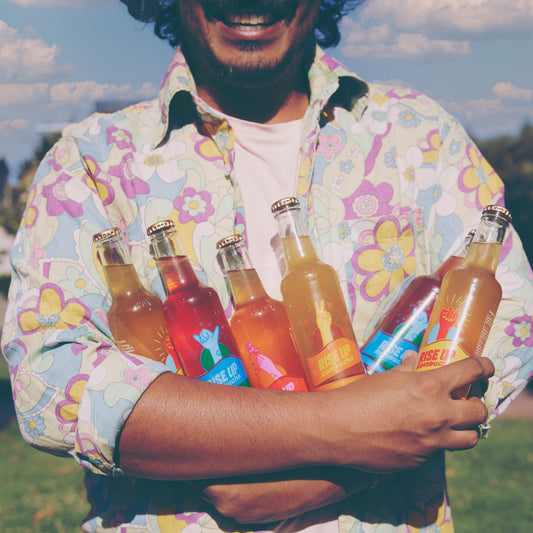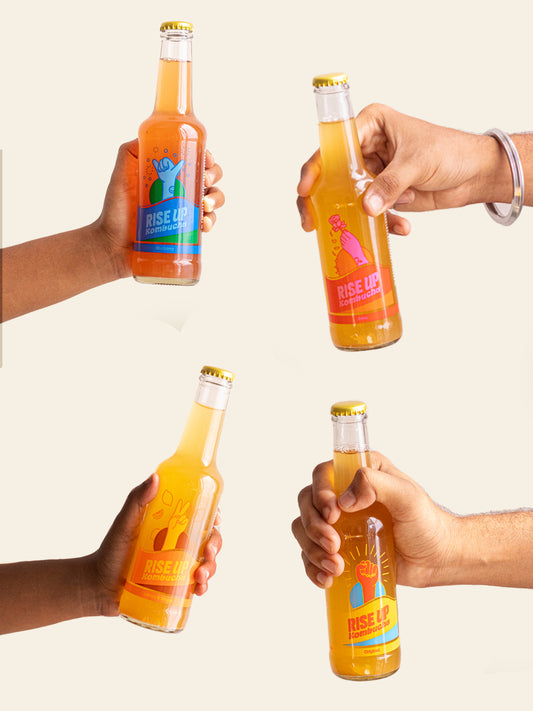Forgot your partner’s birthday? Missed a big deadline? Made an inebriated scene at the family function? Don’t blame yourself, you’re only 43% human!
Pass that blame off to the majority stake holder in your human body – your microbiome.
Comprising a whopping 57% of your cellular makeup, your microbiome is more you than you. Meaning there has never been a better time to quote Shaggy and say “it wasn’t me.”
Get ready to meet your other 57% percent. Enter: the microbiome.
The microbiome is the collective term for the complex & unique community of billions of bacteria, yeasts, viruses, fungi, and protozoa that live inside our bodies and play an essential role in our health. Not only does the microbiome digest our food and synthesis vitamins and minerals, but it also rules our immunity, sleep, mood and behaviour.
This article will highlight the key functions of the microbiome and how our daily choices can either harm or help our billions of little buddies. Sure we can blame our mistakes on our 57% non-human selves, but wouldn’t it better to credit our microbiome with our successes, happy mood, clear skin, easy digestion and robust immunity?
WHAT INFLUENCES OUR MICROBIOME?
Think of your microbiome as a nightclub and you as the bouncer. You decide who comes in and who doesn’t based on your daily behavior. Let’s compare two clubs to see the difference.
Nightclub A, let’s call it Studio 54, is always getting written up in the style headlines, the DJ is spinning soul remixes on vinyl, the disco ball is spinning for sexy makeout vibes, and the dance floor is bumping with beautiful people. Why? That bouncer is letting in heaps of organic fruits and vegetables, whole grains, herbal medicine, fermented foods, good sleep, time outside and exercise.
Nightclub B, let’s call it Jamzz. Jamzz smells like stale beer and the carpet is sticky. Top 40 music is playing from scratchy speakers. The crowd is rough…cursing at each other over the darts boards and tossing back shots of bottom shelf vodka. That bouncer has lower standards, inviting in a diet of processed foods, take out, oily masala heavy foods, UberEats, chip packets, over-sanitising, and too much time indoors.
Our every day actions influence our microbiome and we have the power to change our microbiome overtime, for better or worse, through diet and lifestyle.
MICROBIOME & DIGESTION:
The majority of your microbiome lives inside your gut and this role is what people usually know our microbes best for. They help break down food into less complex parts and produce enzymes that help us to absorb nutrients from our food, including vitamins, minerals, and amino acids. Without the help of these microbes, our bodies would not be able to extract the full nutritional value from the food we eat and we certainly wouldn’t be able to clear our bowels – they break things down and keep it all moving!
The more diverse and complex your microbiome is with good bacteria, the smoother and easier your digestion will be. A healthy microbiome keeps gas, acidity, and bloating at bay.
Terms like gut dysbiosis, IBS (irritable bowel syndrome), and leaky gut are associated with a weaker microbiome. Leaky gut is when food particles move out of our guts and into our bloodstream, spiking an immune response to attack the food as a foreign object in our body. This links back to our microbiome because it is our bacteria that pad up the epithelial lining of our gut, which is the 1-cell thick separation between our gut and the rest of our body. Leaky gut is when that lining is not solid or strong (due to inflammation and reduction in essential bacteria) and thus permeable.
MICROBIOME & MOOD:
Statistically, there is a 75% comorbidity between folks with diagnosed depression and irritable bowel syndrome (IBS). That stat is evidence enough to prove that mood and microbiome are linked. When our gut is in dysbiosis (meaning the uneven balance of good and bad bacteria), we are likely to feel down. We are likely to feel apathetic, anxious, tired, low confidence and overall a propensity towards depression.
Our microbiome also plays an essential role in regulating our circadian rhythms, meaning our sleep & energy cycles.
One of the best things we can do to address our mental health is to start with our gut health. Especially knowing that 90% of our serotonin (the ‘happy hormone’) is produced in our gut!
MICROBIOME & IMMUNITY:
80% of your immune cells are produced in your gut. Chronic inflammation degrades immunity, while a healthy and diverse microbiome is directly responsible for a thriving immune system.
Here we are referring to both the immune reaction to avoiding viruses, cough and cold but also the larger protection from chronic auto-immune diseases.
MICROBIOME IN MODERN TIMES:
Antibiotics. Antibacterial surface spray. Hand sanitizer. Antibacterial soaps (I’m looking at you Dettol!). These products are committing all out warfare on our precious microbiome – wiping out both good and bad bacteria.
While antibiotics have saved countless lives and are arguably the biggest benefit of modern medicine, their over use is harming the diversity of our microbiomes and leading to an unprecedented rise in auto-immune diseases and allergies (a direct result of a weaker microbiome). Research shows that one round of antibiotics changes the make up of the microbiome for up to 2 years!
IMPROVING OUR MICROBIOME:
Consuming a diverse diet of real food (fruit, veg, whole grains) and fermented foods (inherently full of the same beneficial bacteria!) is the best thing we can do to bolster our microbiome. The microbiome thrives with diversity, so consuming a range of fermented foods is best.
Rise Up Kombucha is raw, unfiltered and genuinely probiotic. Meaning each bottle is packed with beneficial yeasts and bacteria that will move into your gut and become part of your thriving microbial community. Consistently drinking Rise Up will shift your microbiome for the positive. Include other fermented foods as well to increase diversity! That means kimchi, sauerkraut, pickled veggies, homemade yogurt, and raw cheeses. Fermented foods like idli, dosa and sourdough bread are easy to digest because of the bacteria, but don’t contain live bacteria when we eat them because they are cooked. Consuming RAW fermented foods is the surest way to bolster your microbiome.
Changing our microbiome for the better can take months. Start slow and build up your consumption of fermented foods over weeks. Starting with a glass of kombucha every day is the easiest (and tastiest) place to begin. Over a couple weeks as your body starts to get used to fermented foods, increase to drinking 1 bottle of kombucha a day AND include a serving of fermented vegetables and yogurt. Order a case of kombucha here to start the gut healing journey today.
Resources:







